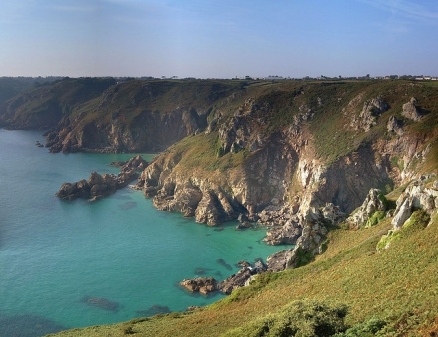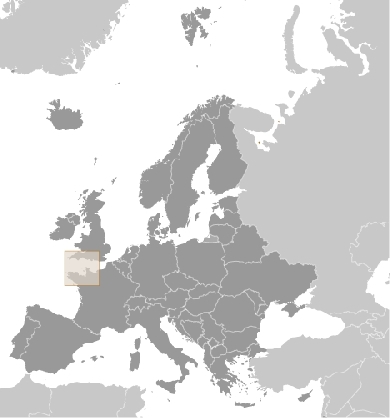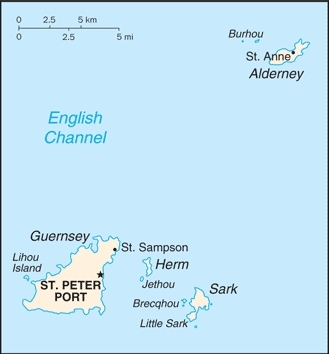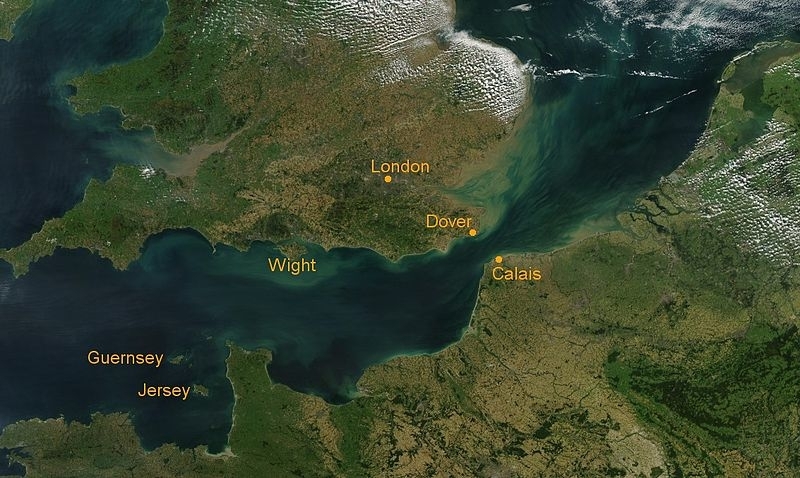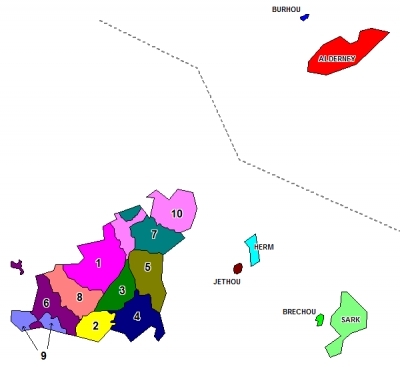Guernsey
| Topics: |
Officially known as the Bailiwick of Guernsey, this group of islands (Alderney, Guernsey, Herm, Sark, and some other smaller islands) contain about 65,000 people in the English Channel, northwest of France.
The islands are a British crown dependency. Together with the islands of the Bailiwick of Jersey, the islands of Bailiwick of Guernsey are collectively known as the Channel Islands.
Guernsey and the other Channel Islands represent the last remnants of the medieval Dukedom of Normandy, which held sway in both France and England.
The islands were the only British soil occupied by German troops in World War II. Guernsey is a British crown dependency but is not part of the United Kingdom or of the European Union. However, the UK Government is constitutionally responsible for its defense and international representation.
There is large, deepwater harbor at Saint Peter Port.
Contents
Geography
Location: Western Europe, islands in the English Channel, northwest of France
Geographic Coordinates: 49 28 N, 2 35 W
Area: 78 sq km. Note: includes Alderney, Guernsey, Herm, Sark, and some other smaller islands
Coastline: 50 km
Maritime Claims:
territorial sea: 3 nm
exclusive fishing zone: 12 nm
Terrain: mostly level with low hills in southwest. The highest point is an unnamed elevation on Sark (114 m).
Climate: temperate with mild winters and cool summers; about 50% of days are overcast
Natural Resources: cropland
Ecology and Biodiversity
The Atlantic mixed forests ecoregion which covers much of the western coast of the Eurasian continent also covers much of Guernsey.
The island of Sark is included within the Celtic Broadleaf Forests ecoregion.
People and Society
Population: 65,345 (July 2012 est.)
Ethnic Groups: British and Norman-French descent with small percentages from other European countries
Age Structure:
0-14 years: 14.9% (male 5,036/female 4,670)
15-64 years: 68% (male 22,195/female 22,049)
65 years and over: 17.1% (male 4,952/female 6,166) (2011 est.)
Population Growth Rate: 0.41% (2012 est.)
Birthrate: 10.04 births/1,000 population (2012 est.)
Death Rate: 8.52 deaths/1,000 population (July 2012 est.)
Net Migration Rate: 2.59 migrant(s)/1,000 population (2012 est.)
Life Expectancy at Birth: 82.24 years
male: 79.57 years
female: 85.04 years (2012 est.)
Total Fertility Rate: 1.54 children born/woman (2012 est.)
Languages: English, French, Norman-French dialect spoken in country districts
Literacy (age 15 and over can read and write):
Urbanization: 31% of total population (2010) growing at an annual rate of growth of 0.8% (2010-15 est.)
Source: NASA/Wikimedia Commons
GovernmentDependency Status/Government Type: British crown dependency/parliamentary democracy Capital: Saint Peter Port Administrative divisions: there are no first-order administrative divisions as defined by the US Government, but there are 10 parishes:
|
Legal System: customary legal system based on Norman customary law, and includes elements of the French Civil Code and English common law.
Saint Peter Port. Source: Steve Neville/Wikimedia Commons.
Economy
Financial services - banking, fund management, insurance - account for about 23% of employment and about 55% of total income in this tiny, prosperous Channel Island economy.
Tourism, manufacturing, and horticulture, mainly tomatoes and cut flowers, have been declining. Financial services, construction, retail, and the public sector have been growing. Light tax and death duties make Guernsey a popular tax haven.
The evolving economic integration of the EU nations is changing the environment under which Guernsey operates.
GDP: (Purchasing Power Parity): $2.742 billion (2005)
GDP: (Official Exchange Rate): $2.742 billion (2005)
GDP- per capita (PPP): $44,600 (2005)
GDP- composition by sector:
agriculture: 3%
industry: 10%
services: 87% (2000)
Agricultural products: tomatoes, greenhouse flowers, sweet peppers, eggplant, fruit; Guernsey cattle
Industries: tourism, banking
Currency: Guernsey pound
